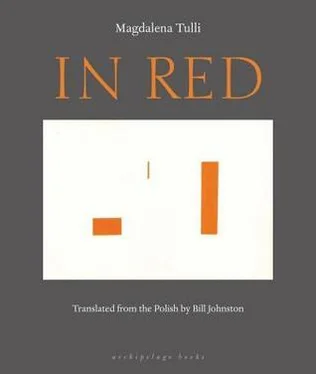Magdalena Tulli - In Red
Здесь есть возможность читать онлайн «Magdalena Tulli - In Red» весь текст электронной книги совершенно бесплатно (целиком полную версию без сокращений). В некоторых случаях можно слушать аудио, скачать через торрент в формате fb2 и присутствует краткое содержание. Год выпуска: 2011, Издательство: Archipelago Books, Жанр: Современная проза, на английском языке. Описание произведения, (предисловие) а так же отзывы посетителей доступны на портале библиотеки ЛибКат.
- Название:In Red
- Автор:
- Издательство:Archipelago Books
- Жанр:
- Год:2011
- ISBN:нет данных
- Рейтинг книги:3 / 5. Голосов: 1
-
Избранное:Добавить в избранное
- Отзывы:
-
Ваша оценка:
- 60
- 1
- 2
- 3
- 4
- 5
In Red: краткое содержание, описание и аннотация
Предлагаем к чтению аннотацию, описание, краткое содержание или предисловие (зависит от того, что написал сам автор книги «In Red»). Если вы не нашли необходимую информацию о книге — напишите в комментариях, мы постараемся отыскать её.
In this inventive novel, Magdalena Tulli creates a world that is unreal, yet strangely familiar and utterly convincing. Set in a mythical fourth partition of Poland,
is full of haunting descriptions of the town and its inhabitants; its power lies in Tulli's evocative, almost hallucinatory use of language.
In Red — читать онлайн бесплатно полную книгу (весь текст) целиком
Ниже представлен текст книги, разбитый по страницам. Система сохранения места последней прочитанной страницы, позволяет с удобством читать онлайн бесплатно книгу «In Red», без необходимости каждый раз заново искать на чём Вы остановились. Поставьте закладку, и сможете в любой момент перейти на страницу, на которой закончили чтение.
Интервал:
Закладка:
“Where’s the tailor?” people asked. “Where’s the mother of the baby?”
No one was minding the orphanage anymore; the boys had run away, and their shaven heads were seen everywhere. They burst in on the residents of basements and stuffed their pockets with bread and pinchbeck jewelry. In one attic they found a dusty chest containing a number of homemade grenades. Later, grenades in hand, they ran at the head of the crowd, took aim at those running away, and hit their targets. “Anyone that gets up, grab them and don’t let go!” they shouted. But there was no one to grab; those struck died once and for all.
Where were the bankers, the owners of large department stores, and the industrialists; where was the mortmain property that everyone deserved a small part of? A rumor circulated that Loom, Neumann, and Slotzki were one person, and that they had assumed the form of a black pointer with red eyes. In their hunt for the dog, the surging mob found itself in front of the theater. The last grenade was tossed, yet it did not go off but simply fell to the ground and spun. Lured by the explosions, Adaś Rączka followed the noises, wearing his hat and carrying an umbrella. He recognized his own work from the sound.
“A botched job,” he murmured as he reached down for the last of the grenades. In the meantime cobblestones dug up from the street were already being thrown at the pointer. But they did not attain their target. Many people saw the dog disappear through the doors of the theater, which a moment later turned out to be locked tight, though the sounds of a party could be heard coming from the upstairs windows. Someone saw the flash of a red eye behind a pane and threw a stone. A short moment later there was not a single window still intact in the whole of Rauch’s theater.
Drafts ran riot through the corridors and storerooms and cellars, blowing into every corner and fanning the forgotten embers still burning beneath the floor. Flames crept through cracks in the floorboards. Jars of powder burst from the heat, while above them dried roses burned in swirling pastel clouds. Mirrors suddenly vanished, shattering into pieces. In the director’s office Max Fiff’s halberdiers ran to the cabinets and started blocking the windows with them, feeling no heat other than the one that burned their innards, determined to defend themselves against the stone-throwing mob. In this way they cut off their own escape route. The office door came crashing down from the violent breath of the fire, and a dark, acrid smoke filled the entire room up to the ceiling. Coughing and bumping into one another, they thrashed about in the black fog lit time and again by a frenzied red. Max Fiff groped his way to the exit and thus was the first to plunge into a flaming hell of needless love and impotent hatred; he was followed by his people, on their knees, crawling, dying as they went. Max made it down the stairs and staggered to the side door; with his last remaining strength he managed to get outside, where he stumbled over the body of Adaś Rączka. Once the flames had consumed the cabinets they shot out through the windows. A great gala of red split the theater open and took possession of the whole town.
“How beautiful it is,” said one of the blind seamstresses in delight, sitting at her window. In the darkness she inhabited, only that which shone with its own light could be seen.
The porters, their faces smudged with soot, ran in as fast as their feet would carry them to bear Rauch out of his apartment in the armchair.
“I didn’t call for you,” the director exclaimed from the piano. “Get out!”
“Suit yourself,” the porters panted as they fled. “Hope you burn in hell.”
Jacques Rauch remained at the white piano as if he were fastened to it by an invisible chain. In the hot air the high notes sounded ever lower, while the low ones growled, barely audible. The strings performed a music that flowed directly from the world’s innards, the kind that requires no keyboard. The white piano was playing off key. Rauch bowed his head and listened.
“The music of the spheres is out of tune,” he asserted.
The flames engulfed his back, reflected in the raised lid as if in a mirror. All at once the fire shot toward the ceiling and the frame of the piano collapsed with a crash.
Meanwhile, at the tavern the firefighters, exhausted from the work of preparing the festivities, had collapsed over their beer mugs in the corner, so sound asleep a cannon could have been fired right over their heads and they wouldn’t have woken. People tugged at the aiguillettes on their dress uniforms and poured buckets of cold water over their heads. But the Hotel Angleterre was already in flames.
The red-hot air caused the locks to open on Natalie Zugoff’s famous fifteen suitcases that were as heavy as boulders. Letters from admirers came spilling out. On the opened envelopes a green or brown Nicholas, Wilhelm, or Franz Joseph rested his medals against the yellowed border of a postage stamp. They had nothing but medals, not even pants or boots. The letters must have gotten wet at some moment, for the ink was smudged and the handwriting illegible. The streams of words cast generously onto the paper no longer had any substance. It was only in the fire that they spoke: they burned with a vivid flame that was as fierce, as predatory, as destructive as rapture or despair. They showed what they truly were, then in the blink of an eye they turned to ash. At that moment, in the neighboring room the music boxes suddenly began to play. The blockades on the mechanisms were released, the taut springs set the machinery in motion, the cylinders began to turn, and in the chaos of the blaze the decorative little cases emitted every melody at once, halting and overlapping one another, then obstinately going back to the beginning till the thin little copper strips winding around the axes of the cylinders caused a series of deafening explosions.
In the red glow there emerged a harmony of cracking ceilings, an arrangement of large sofas and of three-door wardrobes crashing pell-mell to the ground. In the gaps that suddenly opened up there appeared furious currents of air begotten from that which was most unstable — the truth of flaming red, lovely and futile. And under their onrush that which was made of brick and had foundations began to quake and crumble.
Throughout the night the inhabitants of Stitchings threw buckets of water at the flames; in the early morning the smoldering ruins turned into mounds of mud strewn with colored gambling chips and bent playing cards, shattered toilet bowls made by Slotzki & Co., condensers from Ludwig Neumann’s warehouses, and even spent shell casings from Loom’s munitions plant, which before dawn had erupted in multicolored fireworks beneath the vault of the soot-blackened sky.
The history of Stitchings survived the fire. Stories are indestructible. They were repeated in the lines for field kitchens as if nothing had happened. They endured, sewn together any old how, so long as the thick threads held cause and effect in the right order. Memory yields most easily to the shape of ready-made patterns. Even if the decayed fabric has gotten overstretched and tears with a loud noise, never mind the rips, for they are not what the eye lingers upon.
The story of the shreds of red silk that settled on uniforms led to the one about the counterfeit money put into circulation by circus monkeys. They in turn led inevitably to the one about the conspiracy among the dead financiers that resulted in the town being consumed by a conflagration.
No one wept. Not for the merchants who perished barricaded in their stores; nor for the seamstresses plunged in darkness; nor for the drunken sailors who went to the bottom; nor for the hoodwinked soldiers of the Great War. Nor, all the more, for the monkeys. Subsequent events were lost in the gathering gloom, growing sluggish in the frosty air. Where can new stories be found? Their number is limited, all of them without exception known through and through since time immemorial. They do not require one’s attention. Just the strength to carry them, old rags moldering in unwieldy bundles that make one’s arms ache.
Читать дальшеИнтервал:
Закладка:
Похожие книги на «In Red»
Представляем Вашему вниманию похожие книги на «In Red» списком для выбора. Мы отобрали схожую по названию и смыслу литературу в надежде предоставить читателям больше вариантов отыскать новые, интересные, ещё непрочитанные произведения.
Обсуждение, отзывы о книге «In Red» и просто собственные мнения читателей. Оставьте ваши комментарии, напишите, что Вы думаете о произведении, его смысле или главных героях. Укажите что конкретно понравилось, а что нет, и почему Вы так считаете.












